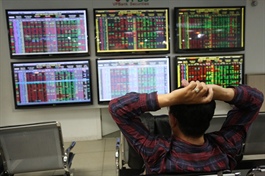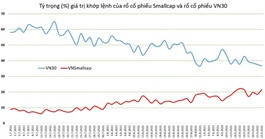When higher prices do not translate to better profits
When higher prices do not translate to better profits
Although global oil prices continuously hit new peaks, not all Vietnamese oil and gas companies have benefited from the higher prices.

Oil prices have skyrocketed since the beginning of the year on tight supplies and global recovery demand, with Brent crude rising over 50 per cent this year and reaching a three-year high of US$80.75 per barrel on Tuesday.
For upstream companies in the industry, analysts from Viet Dragon Securities Corporation (VDSC) said that firms like PetroVietnam Technical Services Corporation (PVS) and PetroVietnam Drilling & Well Services Corporation (PVD) are expected to benefit from big oil and gas projects.
However, in the first half of the year, these enterprises’ business results were not very positive due to the impact of the fourth outbreak of COVID-19. Moreover, during that period, there were not many new oil and gas projects in the country.
In its revised semi-annual financial statements for 2021, PetroVietnam Drilling reported a decrease of 60.7 per cent and 47.4 per cent in revenue of the parent and consolidated companies, respectively, in the first six months of the year.
The company explained that there was no revenue from leasing rigs during the period, while prices of jack-up rigs declined by 15.1 per cent compared to the same period last year.
The rig utilisation rate also fell to 74 per cent compared to 89 per cent of the same period last year.
On the other hand, midstream and downstream companies such as PetroVietnam Gas JSC (GAS), Binh Son Refining and Petrochemical Company (BSR) recorded positive profits in the first half of the year, helped by a steady uptrend in oil prices, leading to higher selling prices or improved gross margins.
Experts from VDSC, however, warned that in the second half of the year, these companies’ profits may be affected due to the COVID-19 outbreak in Viet Nam, especially as HCM City and other provinces in the Mekong Delta carried out Directive 16 since the beginning of July, resulting in lower energy demand.
According to Viet Capital Securities JSC (VCSC), disruptions caused by the COVID-19 pandemic in the third quarter have affected fuel demand, leading to higher inventory in Binh Son Refining’s warehouse, thereby increasing the cost of external storage.
Binh Son Refining is planning to reduce production and submit a proposal to the Government on prioritising domestic petroleum products over imported products, as the sharp fall in gasoline consumption caused the plant to reduce its capacity to 90 per cent (in the worst case) compared to the normal level of 105-110 per cent.
Experts from VCSC lowered their forecasts for Binh Son Refining’s 2021 sales to 6.1 million tonnes, down 12.6 per cent, with an operating efficiency of 92 per cent. However, they still expected gasoline demand will recover in the fourth quarter of 2021 and sales are forecast to grow 16.1 per cent in 2022.
The Domestic Market Department, Ministry of Industry and Trade, said that in the near future, the petroleum market will face many fluctuations and prices are also likely to increase.
It is because economies are gradually recovering, vaccination proportion is increasing, countries start to reopen and use COVID-19 green cards as licences to restart production and business, travel, transportation, and tourism.
On the stock market, last week, oil and gas stocks witnessed outstanding performance. Of which, many key stocks in this industry increased by over 10 per cent like PVD and GAS.
The market capitalisation of the oil and gas industry increased by 5.1 per cent, with PVD up 10.8 per cent, BSR up 10.8 per cent and PVS up 7.9 per cent.
The sharp increase of Brent crude contributed to the strong movements of domestic oil and gas stocks. However it will not have positive effects on business results, Le Xuan, a senior trader, said.
“It only has effects for the short-term as it is more about speculation and doesn’t have much positive impact on the business results of the third and fourth quarters of 2021,” said Xuan.
“In the medium- and long-term, the industry still mainly depends on the business foundation and drilling projects.”



























